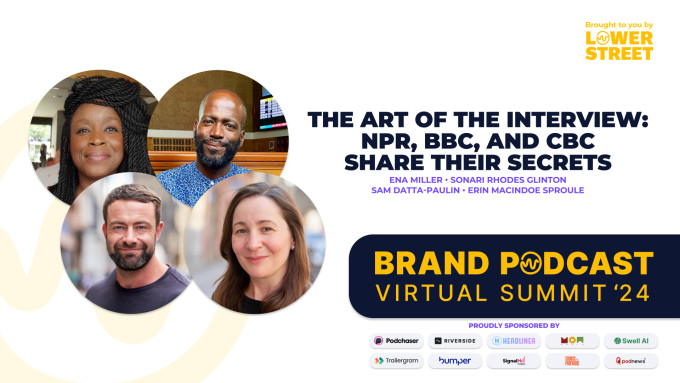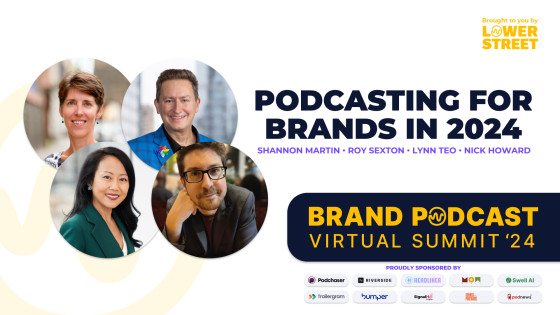The Art of the Interview
Contents

Great interviews make a great podcast, there’s no doubt about it. Whether you're a seasoned podcaster or just starting out, mastering the art of the interview is essential for creating compelling content that captures your audience's attention.
This post brings together key insights from our session “The Art of the Interview: NPR, BBC, and CBC Share Their Secrets” held at the Brand Podcast Summit. The session brought together Sonari Glinton (Host of Shattering the System, award-winning journalist for NPR), Ena Miller (known for her incredible work with BBC), Erin MacIndoe Sproule (Executive Producer for Lower Street), and myself, Sam Datta-Paulin ( Executive Producer at Lower Street).
In this blog post, I'll share our experiences and everything we have learned about conducting engaging and impactful interviews.
The Power of Preparation
The art of interviewing doesn’t begin when you have your guest in front of you. You need to be prepared and ready, both with your technical equipment, with your knowledge, and with your questions.
To humble ourselves, we each shared a moment when an interview went terribly. Sonari and I had both run into technical mishaps. Yes, even I have forgotten to press record and Sonari unfortunately has had issues with tapesyncing (if you wanted to guess how long we have been doing this, that’s a major clue).
On the other hand, Erin herself has been caught not doing her prep work. Once she was to interview an expert on Marie Antoinette, and it was clear to her guest that she had not done her homework. The guest was offended and it led to an awkward situation.
As you can see, it’s important to be thoroughly prepared, but you’ll also want to maintain flexibility and spontaneity during the interview process. While it's crucial to understand the background and expertise of your interviewee, over-preparing can sometimes lead to a dry and scripted interview. Instead, strive to strike a balance between being well-informed and leaving room for organic conversation.
After all, podcasting is an organic, authentic medium - you always want to leave room to be genuinely surprised by your guest. My tip for finding the best balance is to know just enough about your guest to ask sensible questions and probe for their answers.
Some of the best moments of our interview experiences have been when we listen and respond, rather than reading off a scripted question.
Building Trust and Establishing Rapport
In podcasting and journalism, building trust and rapport with your interviewees is essential for an engaging piece. The audience can hear that connection, and it draws them in.
But this relationship shouldn’t begin right when you hit record, get to know your guest during the pre–interview process.
As Erin emphasizes, the pre-interview phase is an opportunity to establish a connection with your interview subjects. By allowing them to ask questions and understand your intentions, you can create a comfortable environment that fosters open and authentic dialogue.
This approach is particularly crucial when dealing with sensitive or vulnerable topics, as it ensures that interviewees feel respected and understood.
Finding the Human Element in Technical Topics
Podcasts and interviews aren’t often fiction, and sometimes we as interviewers can be faced with some dense technical topics that might seem dry to certain listeners.
The key to these interviews is to uncover the human element within the subject matter. Everyone has a story to tell, it just might not look like the classic narrative we have in our mind.
You can bring seemingly mundane topics to life by tapping into the personal perspectives and stories behind them. If you see your interviewee leading the conversation with dry answers, pop in and ask the questions to make them explain “Why is this interesting?”
It also never hurts to have a little fun and be yourself, Ena shared a great example when she had to interview the new tenant of Margaret Thatcher’s home, she just went ahead and had a laugh. She asked how it would feel to use the same bidet as Margaret Thatcher- a question that caught her interviewee off-guard but allowed for laughs and a more open conversation.
By connecting with the human side of any subject, you can transform complex concepts into compelling narratives that resonate with your audience.
The Art of Active Listening
An interview is more than a series of questions and responses, it’s an opportunity to lead the guest to share their story and insights. And you can’t lead without listening.
You need to truly listen to your interviewee and be present in the moment. It’s these authentic interactions between listener and storyteller, that we capture incredible moments in interviews.
By actively engaging with the interviewee's responses and asking insightful follow-up questions, you can unearth deeper insights and create a more engaging interview experience.
Sonari shared an incredible example of this, have a watch here:
During this interview, the interviewer listened closely to the interviewee and was completely present in the conversation with them. In this way, they knew to respond was not listing off questions, but simply to say “You sound tired”. Which opened the speaker up to share more.
Overcoming Challenges and Embracing Vulnerability
There often comes a time when we have to interview a guest about a sensitive topic, especially in the journalism sphere. This can be a challenge, but ultimately by embracing vulnerability and activating your own listening skills, it can be a great experience.
Sonari Glinton highlighted the importance of being transparent and vulnerable as an interviewer, creating a space for genuine human interaction. In his podcast Shattering the System he has often had to interview individuals in vulnerable situations, he found it was key to opening a long pre-interview process. Allowing them to know exactly who you are, letting people know what you are about and what role they will play in the story. This takes patience - fostering a true connection could take weeks or months, but it will be worth it for the authentic story.
Empathy and Authenticity
Throughout our discussion, the recurring themes of empathy and authenticity emerged. And if we were to identify one “secret” to a great interview, it would be just that. Establishing, and conveying, true human connection.
Approach your interviews with genuine curiosity and empathy for the interviewee's story. By setting aside personal agendas and egos, podcasters, and journalists alike can create a space for authentic and meaningful conversations that resonate with listeners.
Conclusion
Mastering the art of the interview includes focusing on your preparation, empathy, active listening, and a willingness to connect with the human experience. As podcasters, it's essential to approach interviews with an open mind and a genuine interest in the stories and perspectives of those being interviewed. By striking a balance between preparation and spontaneity, fostering trust and rapport, and embracing vulnerability and empathy, you can elevate your podcasting skills and create impactful content that resonates with your audience.
Thinking about launching a podcast for your brand?
If you need a hand launching, producing, or promoting your branded podcast, the Lower Street team is here to help. Get in touch for a free consultation.
Contact us




